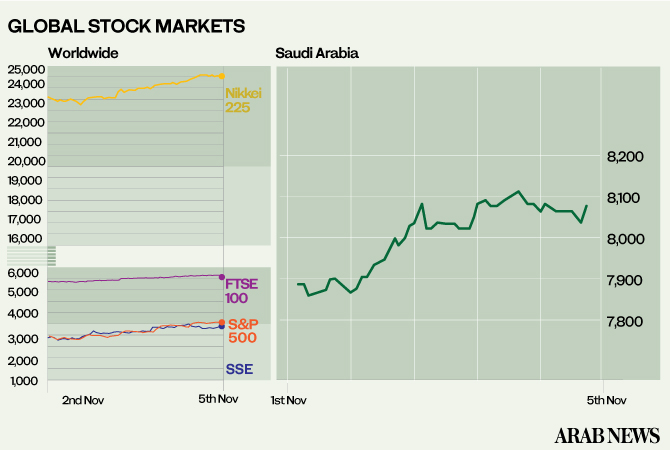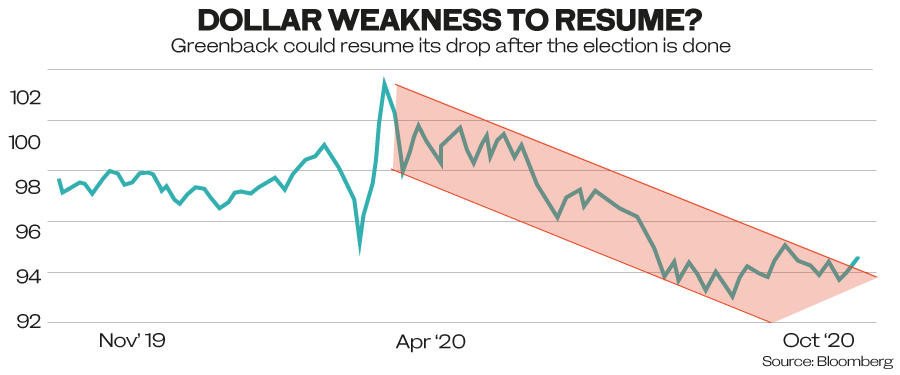The week that was:
The US presidential election remains a cliffhanger with both candidates neck and neck. At the time of this column the odds were in favor of former vice president Joe Biden.
Markets rallied in post-election exuberance with growth stocks, especially tech, taking the lead. On Wednesday the S&P 500 gained the most in modern stock market history, adding some $600 billion, most of which could be attributed to Big Tech. This is interesting because they disappointed last week despite 3Q earnings.

In China tech stocks have performed well, with companies hoping for better US-China trade relations and the tech wars abating under Biden. Green Tech has equally rallied, hoping on the US rejoining the Paris Accord on Climate Change and new green policies in the US.
Oil made good some of last week’s losses with Brent at $39.81 per barrel and WTI $37.57 per barrel at midday CET. US EIA’s reported US crude inventories to have fallen 8 million barrels for the week ending Oct. 31. However, the outlook is less than rosy with lockdowns in Europe and growing coronavirus cases in North America affecting demand. At the same time Libyan supply has come back with a vengeance and is expected to reach 1 million barrels per day before year end.

As England went into lockdown, Chancellor of the Exchequer Rishi Sunak extended the furlough scheme through March 2021. Employees under the scheme will receive 80 percent of their salaries. The scheme will cost the Treasury £1 billion (SR4.92 billion) per month per 1 million insured.
The Bank of England (BoE) is leaving interest rates stable at 0.1 percent. The central bank has sent a survey to lenders to gauge the impact of negative interest rates, should they become necessary. The BoE has no plans to lower interest rates further at this point, but announced further bond purchases to the tune of £150 million. BoE Gov. Andrew Bailey reiterated the need for more fiscal stimulus and indicated that he was open to increase the central bank’s bond purchasing program.
The health of mortgage lending books of the country’s banks is of particular concern to the BoE, because mortgage lenders have steadily increased how much they charge and unemployment is on the rise.
The Chinese government put a spanner in the works of the $35 billion IPO of Jack Ma’s Ant Group on the Shanghai and Shenzhen exchanges. The IPO was billed to become the largest in history.
The Chinese government changed the rules for microlenders, including a 30 percent funding ratio for loans, capping individual loan sizes at $45,000, only allowing online microlenders to operate within their provincial territory and limiting control of any company to one nationally operating microlender.
This was a blow to Ant’s Credit Tech, which contributed 40 percent to the Ant Group’s earnings in 1H 2020. Credit Tech provided small unsecured loans to 500 million customers from July 2019 through June 2020. The subsidiary owns two microlenders and its revenue grew 59 percent during the first six months of 2020.
Meanwhile the earnings season continued:
Saudi Aramco’s net profit stood at SR44.21 billion ($11.7 billion), down 44.6 percent compared to the same quarter in 2019. This compared positively to the second quarter when net profits stood at SR24.75 billion, reflecting historically low oil prices and historically high production cuts by OPEC+. The company will maintain its dividend of $18.75 billion.
Aramex 3Q profits attributable to shareholders dropped by 59 percent compared to the same quarter last year, coming in at AED46.2 million ($12.5 million). The reason for the steep drop in profitability was a one-time non-recurring provision. Last quarter revenues came in at AED1.51 billion down 19 percent compared with 3Q 2019.
Uber had rallied earlier in the week after California voters approved Proposition 22, which allows Uber drivers to register as independent contractors rather than employees. Uber reported revenues of $3.13 billion and a loss of 65 cents per share. The company lost 4 percent in after-hours trading when the results were released. Deliveries outpaced bookings for rides and mobility.
In Europe, Commerzbank, Societe Generale, ING and UniCredit SpA reported. Except for Commerzbank they were all profitable. They were all able to lower their loan loss provisions compared with Q2. This is a rear-view image, because restrictions and lockdowns will have a materially adverse effect on the economic outlook.
Commerzbank had a loss of €63 million ($74.8 million) and revenues of €2.2 billion. Loan loss provisions stood at €272 million. Societe Generale displayed a remarkable turnaround from a net loss of €1.26 billion in Q2 to a net income of €862 million in Q3 of 2020. This was nearly 49 percent above analysts’ expectations. ING reported a net result of €788 million, beating expectations. Provisions stood at €215 million. The bank vowed to return 50 percent of net profits to shareholders, which is not possible due to the ECB’s ban on dividends and share buy-backs for banks. The bank will put the appropriate amounts aside to be distributed once legally possible. UniCredit’s 3Q revenues reached €4.4 billion and underlying net profit came in at €700 million.
Focus:
Joe Biden looks set to win the presidency. However, the prospects of a large stimulus package look smaller, given that the Senate looks to have a Republican majority.
Former Goldman Sachs chief economist and Chatham House chairman Jim O’Neill told Bloomberg that he thinks a Biden presidency with a split congress would be positive for the economy, because it would keep in check the proponents of extreme economic policy measures on both sides of the aisle.
The Fed’s FMOC left interest rates unchanged between 0.00 percent and 0.25 percent. Fed Chair Jerome Powell reiterated that rates would remain low until inflation reached the 2 percent target over time and employment picked up. Like Bailey, Powell indicated that he would be ready to increase the Fed’s bond purchasing program, but warned that fiscal stimulus was of paramount importance. He labeled the current economic crisis the largest of a lifetime.
Meanwhile the dollar exchange rate may continue its slide after the elections are done. US interest rates have approached levels seen in the rest of the OECD and a continued expansionary Fed policy combined with more fiscal stimulus are bound to represent a downward drift for the currency.

Where we go from here:
The Brexit saga continues while there is precious little time left for the UK and EU to come to an agreement on a trade deal.
The various lockdown measures throughout Europe will be reflected in unemployment numbers going forward.
US first time jobless claims for the week ending Oct. 31 came in at 751,000, which represents a decline for the third week in a row, but remains higher than forecast. These numbers will not improve substantially until the country can halt the spread of the virus. Non-farm payrolls for October added 638,000 jobs, bringing unemployment down to 6.9 percent, which is a bigger than expected decline of one full percentage point. However, going forward we shall have to see the impact of the record high coronavirus case numbers (above 100,000 per day) on the job market.
— Cornelia Meyer is a Ph.D.-level economist with 30 years of experience in investment banking and industry. She is chairperson and CEO of business consultancy Meyer Resources. Twitter: @MeyerResources
















